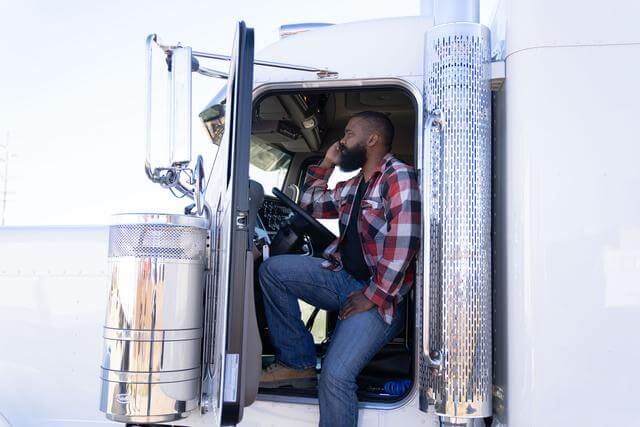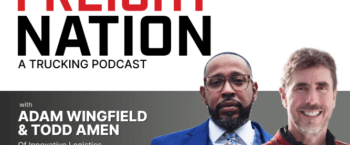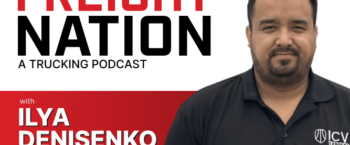How Much Does an Owner-Operator Make?

Join Our
Trusted Network
Help protect your business with the load board you can rely on.
“How much will I get paid?” is one of the most common questions drivers ask when considering a change from working for trucking companies to becoming their own boss. The average owner-operator base salary is nearly $324,000, according to Indeed.com. But this varies widely depending on experience, the type of loads a driver will specialize in and carry, and how much time they spend on the road.
While that may sound like a lot of money, a word of caution: Owner-operators often take home much less than the average base salary when you factor in expenses, with a much lower average for the first year. To figure out an accurate estimate of what you’ll make, you’d need to calculate what you’d net each week and annually after paying those expenses.
Also important: Owner-operators don’t have health insurance benefits through their employer, so they rely on insurance through a spouse or partner or purchase their own insurance. So how much does an owner-operator make? Let’s break down the numbers.
Owner-operator trucking salary vs. company driver salary
There are two ways to look at salary: gross and net. The gross average owner-operator salary is three times what a company driver makes. But that’s before expenses and taxes — net is what’s left after those.
- Company driver
Expenses are fixed and covered for most trucking company drivers. Taxes vary because they are based on the tax bracket they’re in.
The more specialized and experienced a driver is, the more they can earn working for trucking companies. The biggest advantage of being a company driver is that employers handle everything for you. There’s no overhead, so you don’t have to worry about owning a truck or paying employees, and taxes automatically come out of your check. You also don’t have the startup costs of being a business owner. However, when trucking companies handle the logistics of being a carrier, you have less control as a driver.
- Owner-operator
Owner-operators have to buy or lease and maintain their trucks, manage their own schedules, and keep track of their own taxes and business expenses. You control your schedule, time at home, the routes you take, and the type of truck you drive. After initial startup costs, owner-operators have much higher earning potential.
The upshot: The more work you take on, the higher your earning potential.
How do owner-operators get paid?
There are two main ways: a percentage of the load or mileage. Earning consistency is the biggest difference between the two.
- Percentage of load. Drivers take between 65-85% of the load revenue. So if you get a high-paying or valuable load, your pay can be excellent. But a low-value load can hit you hard — sometimes, you don’t break even.
- Mileage. You get paid a set amount for the miles you drive, regardless of the load’s value. It’s more consistent than the percentage-of-load-pay method, but you may miss out on some potentially large paydays.
Which method should you choose? It depends on your situation. The load percentage could work for you if you save your money well, manage cash flow efficiently, and budget conservatively (based on average vs. best-case scenarios). You can bank a percentage of that money for leaner load times when you have valuable loads.
If you need a more consistent pay schedule, especially if you have a family at home, you may want to opt for the mileage route. Your salary will be more consistent and predictable over time.
Because many owner-operators sign on with a carrier to get consistent loads, they may have to choose one payment method. You can combine the two if you work with more than one carrier; it makes bookkeeping and figuring profit and loss more complicated.
To decide what will work best, you need to understand expenses and what they mean to your bottom line.
What kind of expenses do owner-operators have?
Trucking businesses have several expenses. Some are obvious, while others are more challenging to figure out.
Buying a truck
First, you’ll need to buy or lease a truck. Determine these factors before you purchase a truck:
- The type of loads you want to haul
- The lanes you will operate in (which may affect emissions testing)
- Your budget and the best truck you can afford
- Whether you will lease to a carrier, fill your own loads, or a combination
Pro tip: Remember that an older truck will need more maintenance and repairs, and a newer one will cost you more upfront.
Maintenance
Even a brand new truck will need preventative maintenance like oil and fluid changes, tires and wheels, regular grease jobs, compressor maintenance and repair, brake checks and replacements, and regular fuel filter replacements. Regular maintenance can prevent larger problems, but don’t forget to include these expenses in your budget.
Fuel costs
Over time, you’ll learn the average fuel cost for your lanes, but it will vary as fuel prices rise and fall. This expense never goes away.
While rewards and other programs can save you money, they have their limits. Budget for fuel based on the mileage you will travel, and budget for the worst-case and highest-cost scenario rather than the ideal one.
Insurance
You’ll need the right insurance for your truck, but you’ll also need insurance to cover cargo loads if there’s a loss, theft, accident, or other damage to your load. These claims are part of the business, no matter how smooth your operation is.
Before buying truck insurance, consider talking to an agent who understands OTR work and your state’s specific legal requirements and states in your lane. Make sure you’re not paying for coverage you don’t need but have enough to meet legal requirements and cover your own needs.
Taxes and paperwork
Everyone’s favorite! If you were a company driver before, you probably had taxes taken out of your check automatically. Now, you will have to track and pay them yourself, including self-employment taxes and Federal and state income taxes.
A few simple rules will keep you out of trouble with the IRS and your state tax authority.
- Save to pay taxes. Put away 20-30% of everything you earn in a tax savings account (TSA). This guarantees you have the funds to pay your taxes when due.
- Pay quarterly taxes. This keeps you legal with the IRS and prevents a surprise tax bill on April 15.
- Hire an accountant. Unless you are good with numbers and the tax code, hire someone to help with your taxes. They’ll know about specific deductions and how to minimize your tax liability.
- Track everything. This includes mileage and all expenses. You may want to use accounting software. Giving access to your accountant at the end of the year can make your tax prep faster and cheaper.
Also, remember: In most states, you have to file an annual company report (usually online) and might have to renew your LLC or other corporate licensing. You could also be subject to other local business taxes.
Keep these expenses top of mind as you create a budget and determine how much money you will take home.
Pro tip: Once you’re making enough money, your accountant can recommend ways to set yourself up as an employee of your own company. You can deduct taxes and issue yourself a paycheck and bonuses, draw benefits you can deduct from your taxes, and increase your contributions to a 401K to plan for retirement. These are just a few extra perks of being a small business owner.
How can owner-operators make the most money?
To earn the highest net salary, increase your income and reduce expenses. The first step is to maximize your money, which you should outline in your trucking business plan. Here are some money-maximizing ideas:
- Keep your truck moving loads. Use load boards to find quality brokers and loads. Your vehicle will always be working to make money for you. See how load boards work here.
- Get your own authority. It will take a couple of months, so plan accordingly. Your authority is your motor carrier number, which lets you haul freight with your own trucking company. It’s the first step to becoming your own boss.
- Use freight factoring to maximize cash flow by getting payments quickly. Truckstop pays you now; the broker pays us later, giving you operating cash right away.
- Sign up for ITS Dispatch to keep moving loads rather than looking for them and doing manual paperwork. We have affordable dispatch solutions, no matter what size trucking operation you have. The less back-office paperwork you have to do, the more time you can save and the more money you make.
- Protect your business with cargo insurance. When something gets in the way of delivery or cargo is stolen or damaged, you are protected, and you don’t have to pay out settlements on your own.
- Book jobs in the highest-paying cities. Some lanes and cities pay higher rates for moving loads.
The more money you make, the greater your profit margin should be. Reduce expenses to maximize profit.
Other owner-operator trucking salary FAQ’s
Here are some of the most common questions about becoming an owner-operator.
How do I become an owner-operator?
To begin, you’ll need to buy or lease a truck, get your commercial driver’s license, and pass a physical exam. You will also need to:
- Form a business by registering with your state.
- Apply for a USDOT Number.
- Get your trucking authority.
- Purchase truck insurance that meets FMCSA requirements.
- Install FMCSA-compliant electronic logging devices (ELD).
If you plan on getting a loan or financing, you will also need to develop a business plan for how you will manage your business and be prepared to show it along with tax returns or other applicable finance information.
Once everything is in place, then you need to find loads. The Truckstop Load Board for Carriers makes finding loads easy, negotiating rates, and keeping your business running smoothly.
What tax deductions can owner-operators claim?
You can deduct much of the cost of operating your business. While you want to consult with a tax advisor, some of the more common tax deductions for owner-operators may include:
- Interest paid on any business loans
- Depreciation of equipment or property
- Home office
- Insurance premiums
- Retirement plans
- Startup costs
- Supplies
- Permits and license fees
- Travel
- Truck lease
- Accounting services
- Communication equipment
- Truck repairs and accessories
The IRS requires you to document your expenses and demonstrate that they are an ordinary and necessary cost to run your business.
What types of lease agreements are available for owner-operators?
When starting a trucking business, drivers may opt to buy their equipment outright, get a small business loan, or enter into a leasing agreement. Options include a lease, a lease-purchase, and a lease-on agreement.
Lease agreement
You pay a monthly fee to lease the vehicle with a lease agreement. Depending on the terms, you are responsible for maintenance and upkeep and may be required to make a down payment at the start of the lease.
Lease-purchase agreement
Also known as lease-to-own, this option allows you to pay a monthly fee to a carrier or fleet provider for use. At the end of the agreement, you can buy the truck, with a portion of the payments going towards the purchase price.
Lease-on agreement
If you already own the truck, a lease-on agreement lets you lease the rig to a trucking company.
Ready to get started?
If you’re interested in getting started, Truckstop can help you take the first steps in getting your trucking authority. Get in touch to request a demo and enjoy two months of free access to our load board.

Find out how our platform gives you the visibility you need to get more done.
Get helpful content delivered to your inbox.
Schedule a demo.
Find out how our platform gives you the visibility you need to get more done.





